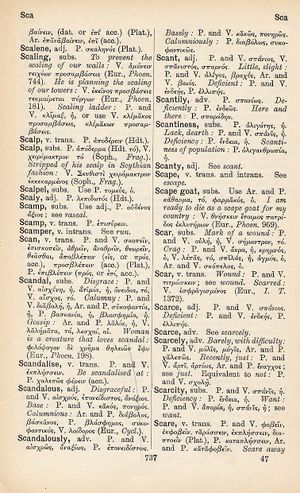scandal: Difference between revisions
From LSJ
ἑωλοκρασίαν τινά μου τῆς πονηρίας κατασκεδάσας → having discharged the stale dregs of his rascality over me
m (Woodhouse1 replacement) |
mNo edit summary |
||
| Line 7: | Line 7: | ||
[[calumny]]: [[prose|P.]] and [[verse|V.]] [[διαβολή]], ἡ, [[Aristophanes|Ar.]] and [[prose|P.]] [[συκοφαντία]], ἡ, [[prose|P.]] [[βασκανία]], ἡ, [[βλασφημία]], ἡ. | [[calumny]]: [[prose|P.]] and [[verse|V.]] [[διαβολή]], ἡ, [[Aristophanes|Ar.]] and [[prose|P.]] [[συκοφαντία]], ἡ, [[prose|P.]] [[βασκανία]], ἡ, [[βλασφημία]], ἡ. | ||
[[gossip]]: [[Aristophanes|Ar.]] and [[prose|P.]] [[λαλία]], ἡ, [[verse|V.]] [[λαλήματα]], τά, [[ | [[gossip]]: [[Aristophanes|Ar.]] and [[prose|P.]] [[λαλία]], ἡ, [[verse|V.]] [[λαλήματα]], τά, [[λέσχαι]], αἱ. | ||
[[woman is a creature that loves scandal]]: [[φιλόψογον δὲ χρῆμα θηλειῶν ἔφυ]] ([[Euripides|Eur.]], ''[[Phoenissae]]'' 198). | [[woman is a creature that loves scandal]]: [[φιλόψογον δὲ χρῆμα θηλειῶν ἔφυ]] ([[Euripides|Eur.]], ''[[Phoenissae]]'' 198). | ||
}} | }} | ||
Revision as of 09:45, 28 June 2020
English > Greek (Woodhouse)
substantive
disgrace: P. and V. αἰσχύνη, ἡ, ἀτιμία, ἡ, ὄνειδος, τό, V. αἶσχος, τό.
calumny: P. and V. διαβολή, ἡ, Ar. and P. συκοφαντία, ἡ, P. βασκανία, ἡ, βλασφημία, ἡ.
gossip: Ar. and P. λαλία, ἡ, V. λαλήματα, τά, λέσχαι, αἱ.
woman is a creature that loves scandal: φιλόψογον δὲ χρῆμα θηλειῶν ἔφυ (Eur., Phoenissae 198).

